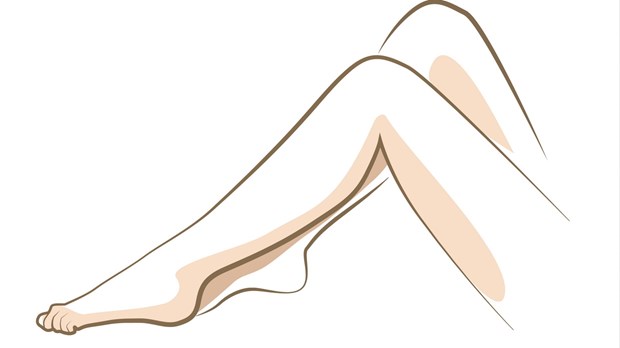What's the Body Really For?

"Nose."
"Breasts."
"Thighs."
"Butt."
As I read these words that had been discretely scrawled onto index cards aloud to my women's Bible study, nothing about them surprised me. I'd asked the women gathered that night to answer this question: "If there was one thing you could change about your body, what would it be?" The fact they were dissatisfied with these physical features was not at all newsworthy.
What I did notice in a fresh way, however, was that every single mention was ornamental, rather than instrumental. For instance, I knew that one woman in our group needed knee surgery. Another lived with a chronically bad back. And yet, because we live in a culture that has conditioned us to consider our body's appearance rather than its function, many of us overlook our needs and strive to meet culture's desires.
Culture's premium on physical appearance
Constance Rhodes, author of Life Inside the Thin Cage and founder of Finding Balance, confirms, "We live in a culture that puts a premium on physical appearance. It can be easy to fall into the trap of focusing on how we look on the outside." The really wily nature of this trap is that—like the precious women from my church—even when we're aware of it, we're not immune to our culture's insistence on the appearance of effortless perfection.
Today most women, and many girls, are aware of the damaging effects of being bombarded daily by images of "perfect" women. We've been assured by health teachers that any real woman with Barbie's proportions wouldn't be able to stand upright. Our eyes have been opened by the Dove Real Beauty Campaign video, "Evolution," featuring a plain young woman being made over and Photoshopped to perfection. And some of us have been appropriately outraged that medium- and dark-skinned women around the globe are being sold the lie—as well as pricey skin creams—that their skin is "too dark."
And yet, for many of us, the information has not transformed our deep places. So even when we're aware of the untenable bind, we find ourselves stuck. And though we'd deny it in a heartbeat, many of us still long for Barbie's blonde hair, miniature waist, artificially perky breasts, and frighteningly long legs.
Despite the values we hold about the inherent value of all people and about faithful stewardship of our resources, we're still stuck.
Our bodies were made to love God—and people
Although identifying what these bodies aren't for—being consumed by the eyes of others—hasn't yet liberated us, many Christian women have found real traction by living into the reality of what our bodies are for.
Jennifer Strickland, former international supermodel and author of Girl Perfect, names this pinch between how our bodies appear and what they were made to do. She explains, "We are tried and tempted to constantly focus on our outward appearance and achievements. We do not have a healthy sense of what's truly important: our relationship with God, friends and family." What Jennifer Strickland has discovered jibes seamlessly with biblical wisdom about what we were made for.
When a teacher of the law asked Jesus one day, "Of all the commandments, which is the most important?" (Mark 12:28), Jesus' answer was simple: love God, love people. And while, on one hand, the directive has nothing to do with cellulite, hair, clothes and makeup, it actually has everything to do with cellulite, hair, clothes and makeup.
A robust Christian theology of the body affirms not only that God made our bodies good, but that they're to be used for relationship with others. Some bodies will do that by swinging a hammer beside future homeowners through Habitat for Humanity. Other bodies will shovel snow off a neighbor's driveway. Some will kneel to tend gardens. Others will kneel in prayer, asking that bodies of precious ones around the globe will have enough food. And—I'm not going to sugarcoat this—some bodies will love others by feeding them strained carrots and, later, changing stinky diapers.
To be clear, the beauty of bodies given to kingdom relationships isn't a contest about who can perform the most amazing feats of service with their bodies. Friends of mine with the most challenging physical limitations use their bodies to be in relationship with others every day—by offering a hug, telling a joke, or sharing a smile. Love, in its many and varied expressions, is what bodies are for.
Five ways you can choose to live freely
We begin to live freely apart from our culture's insistence on bodily perfection when we make daily choices to live into the reality of God's good intentions for human bodies.
Guard your thoughts
As retailers and advertisers have discovered, our behavior begins with our thinking. The often-unconscious thought of "I'm not acceptable the way I am" has netted billions of dollars in makeup and hair products alone!
In his second letter to the believers at Corinth, the apostle Paul exhorted believers to "capture their rebellious thoughts and teach them to obey Christ" (2 Corinthians 10:5). As we do, we find freedom. Jennifer Strickland offers, "I am learning to sort my thoughts like a deck of cards. When I hear condemning thoughts that tell me I am less or others are less, those go in the discard pile. When I hear thoughts that tell me I am more than enough and so are others, I hold onto them." She adds, "When we train our minds to sort our thoughts, we can discard the lies and hold onto the truth of who we are and who others are in God's eyes above all."
Choose your actions
We are further strengthened in the truth when we act on it, using our bodies to disagree with the lie and agree with the truth.
Jennifer Strickland shares that when she gets sidetracked by focusing on her imperfections, she physically steps away from the mirror. She takes a break from Facebook. She remarks, "It's a conscious choice we have to make every day."
Some women, who might garner a lot of attention in a skimpy bikini, have chosen to stick with modest one-pieces. Others make wardrobe choices based on utility rather than fashion (Think Dansko clogs for the workplace rather than injury-inflicting stilettos). Some of these small choices strengthen and reshape our hearts and minds.
Embrace imperfection
Another way we agree with God's truth about bodies is to actively disagree with the lie that our bodies were made to be consumed by the eyes of others.
Constance Rhodes experimented by going a month without makeup. She shares, "I learned that people still liked me even when I didn't look my best. In fact, they felt more comfortable with me that way. This helped me see that it was me, not my appearance, that really mattered in relationship."
Manage your spending
Jesus' injunction that our hearts follow the trail of our credit card bills (Matthew 6:21) means that we can make choices about how we use our money that reform hearts that have been misshapen by a consumerist culture. Specifically, many women have found freedom as they put their money where their mouth is.
After spending $150 on highlights, one woman "broke up" with her hairdresser to be able to channel the money she'd been spending to those in need. A friend and I decided to "fast" from clothes shopping for one year. My teenage daughter applies her allowance not to beauty products, but to sponsor a child through Compassion International. Redirecting our money to be for the bodies of others offers a surprising amount of freedom.
Use your body to love others
You do this as you cook a meal for the family moving in across the street. You do it when you throw vanity to the wind and jump off the high dive with your niece or nephew. Or as you walk the dog of a neighbor who's housebound.
Using your body to be for others does not require much mobility or special skill at all. You do it as you sit beside a struggling child in an afterschool tutoring program. You do it as you sit with an elderly neighbor who's just moved to a nursing facility. You do it as you watch a movie with a child who has Down syndrome while her single mom grabs coffee with a friend.
In small everyday choices, women are experiencing freedom from our culture's wily lie that the purpose of bodies is to be viewed. The one who decides her nose is for smelling flowers experiences freedom. The middle-aged woman who's able to accept her breasts, made extra-floppy after nursing children, lives freely. The one who uses her thick strong thighs to bike across town to a friend's house is free. And even the one who sits on her backside, wiggling her fingers while writing a note to a sponsored child in Bolivia, is doing what bodies were made to do:
Love.
Margot Starbuckis a regular contributor to Today's Christian Woman and the author of Unsqueezed: Springing Free From Skinny Jeans, Nose Jobs, Highlights and Stilettos. Connect on Facebook or at MargotStarbuck.com.
Read more articles that highlight writing by Christian women at ChristianityToday.com/Women
 Read These Next
Read These Next
 How to Talk to Your Daughter About Body Image and the MediaA former Victoria’s Secret model on preserving positive self-image
How to Talk to Your Daughter About Body Image and the MediaA former Victoria’s Secret model on preserving positive self-image The Myth of Self-LoveWhy you can’t love yourself into a better marriage
The Myth of Self-LoveWhy you can’t love yourself into a better marriage









 Homepage
Homepage
